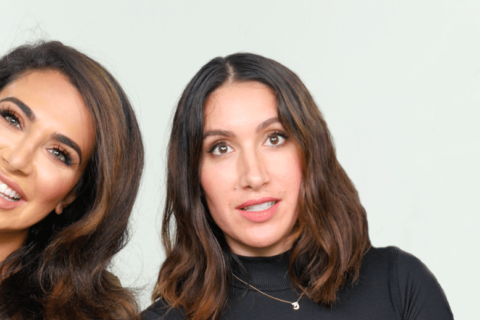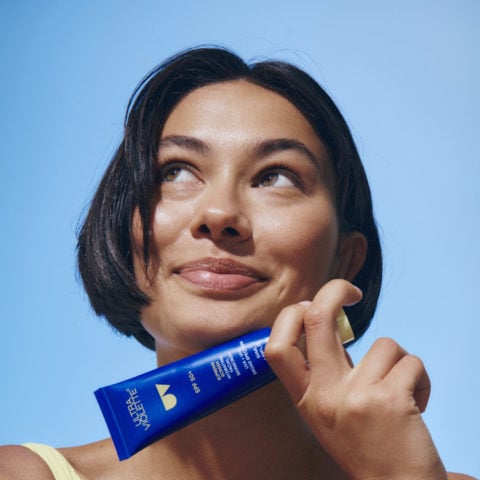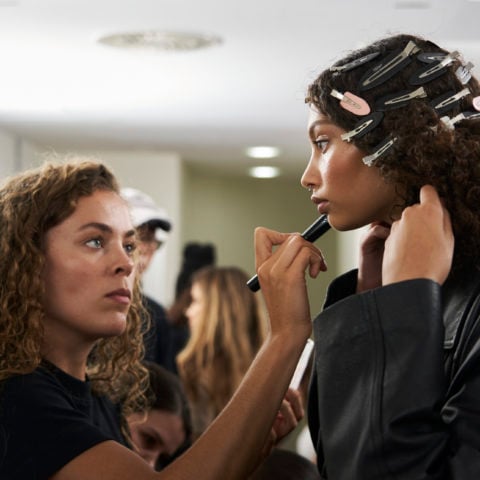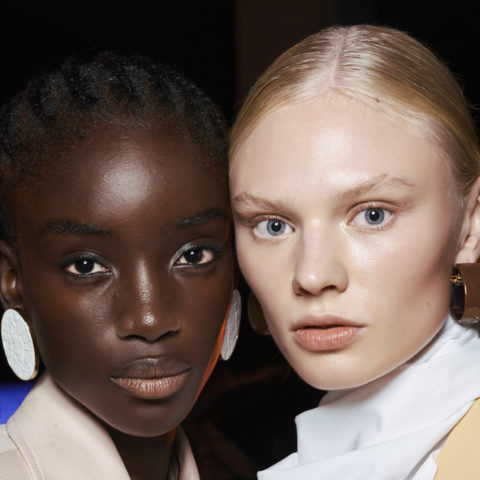We Talked to Huda Kattan, Jen Atkin (and Others!) About Why Dubai Should Be On Everyone’s Beauty Radar
"You know when someone laughs at you first and then copies you later? That’s the Middle East with beauty trends."
When you think of the beauty industry and its capitals, you likely think of the usual four cities: New York, London, Milan and Paris. They also happen to be the fashion capitals of the world. Or at least they were, once upon a time.
But thanks in large part to social media and the access it offers us, inspiration and influence now comes from, literally, all around the globe.
And one of the cities that’s playing a major role in the beauty industry right now is Dubai, boasting beauty trends that are very different from those coming out of the west. Middle Eastern beauty in general tends to take a “more is more” approach. Bold brows and false lashes aren’t reserved for special occasions—for many women, they’re part of a daily routine.
And as a Middle Eastern woman myself, I know this firsthand. While I rarely step out in a full face of makeup, some of my favourite childhood memories involve gathering at a family member’s house before a wedding, where all the women in the family would get ready together. That’s where I was introduced to things like lip overlining, hair extensions and enough kohl eyeliner to fill a drugstore aisle.
That’s why when Emirates invited me to explore Dubai and get to know not only the city, but also its budding beauty scene, I couldn’t say no. So I happily hopped on a 13-hour-long flight in search of beauty secrets from the industry experts in Dubai, land of bold brows and flawless contour.
What I didn’t realize was that my glam education would start before the plane even took off. Emirates prides itself on its comfort, glamour and excess. In fact, I learned that a single first class seat on an Emirates flight—complete with on-board showers, a Bulgari kit of amenities, the largest on-flight screen of any airline (32 inches!), loungewear that uses Hydra Active Microcapsule Technology to release motion-activated, nutrient-rich sea kelp which prevents dehydration and stimulates circulation (!!!)—is valued at around half a million dollars.
Then there are the flight attendants, who I learned have a major beauty trick up their sleeves. A well-known Emirates rule is that the women working the flight must wear a matte red lipstick (of any brand) that perfectly matches the red accents of their uniform. Since they’re flying for long periods of time, the matte lipstick has to be long-wearing and ultra comfortable, even in the dry, harsh air of a flight cabin. The most popular lipstick choice? Write this down: Sephora Collection Cream Lip Stain Liquid Lipstick in 01 “Always Red.”
Imagine the amount of swatching and trial and error required to find the perfect red.
Now that the (chic and actually really relaxing) flight was behind me, it was time to talk to some beauty industry experts about what they love about Dubai and why the city is on its way to becoming a major player in the beauty scene.
Huda Kattan
Dubai’s most famous beauty industry insider is Huda Kattan, Iraqi-American makeup artist and brand founder. About ten years ago, Kattan was working in L.A, where she became a go-to makeup artist for celebs like Eva Longoria and Nicole Richie. Upon moving back to Dubai, she launched a blog called Huda Beauty, and later, in 2013, a successful cosmetics line of the same name.
On Dubai’s love of glam
“Beauty in the Middle East is very glamorous, and the women living in this region love to pamper themselves. Many muslim women wear a niqab or a hijab, so the eyes really are the focus. [We also] have strong features and tend to play them up with eye makeup. Middle Eastern women can get away with wearing false lashes on a daily basis, having a dramatic winged liner, or being really bold when filling in their eyebrows.
We love to take chances and be quite daring. Women in Dubai love going full glam on any regular day; that means lashes, contour, highlight, prominent brows and a perfect eyeliner. European and [North American] women are definitely a lot more natural when it comes to their makeup.”
On skincare
“When it comes to skincare, we love natural ingredients–like using coconut oil to remove our makeup, castor oil for our brows, or using rose water as a toner. A lot of Middle Eastern women use ingredients from around the house because it’s what their mothers and grandmothers did for so many years and they trust it!
However, in the west, women are more aware of ingredients lists and if there is SPF in their products.”
On Dubai as an up-and-coming beauty industry hub
“I think Dubai will be the [leader in] ‘modern beauty.’ You can get the very best products here, some of the best Hollywood doctors and dentists practice here, and because the city is very young, it leads the way with beauty trends. Dubai offers unlimited possibility. I moved here permanently in 2008 and it was a really interesting time in my life. It was a time of self-discovery and what the UAE represented for me was limitless opportunities.
The Middle East is a really vibrant market and the beauty industry is fast-growing, particularly when it comes to indie and niche beauty brands. I feel like beauty is a necessity in the Middle East. Because of their amazing features, women in the Middle East wear more makeup to enhance their big beautiful eyes and bold brows. They’ve always loved makeup. Being very glam and over-the-top is a part of Middle Eastern culture and history; it’s as though it’s in your blood to love beauty.”
Jen Atkin
Celebrity hairstylist and founder of Mane Addicts and Ouai Haircare, Jen Atkin, visits Dubai regularly, as many of her clients are located in the UAE and are willing to pay serious cash to have her cut their hair.
On what draws her to Dubai
“I’ve been traveling to Dubai for 5 years now. I go four or five times a year, for a week at a time. A lot of my followers [and clients] are in the Middle East.”
On the retailers and industry in Dubai
“The beauty industry & retailers are so glamorous and savvy. Everyone does their research and knows about the best beauty regimes for gorgeous hair and skin.”
On what she’s learned from Middle Eastern clients
“Middle Eastern ladies tend to have hair that’s twice as thick as, and longer than, that of my clients back in Los Angeles. My clients here have taught me a lot about what women need. I learned about hair masking from them! They told me they have weekly masking nights at home with their family. That inspired me to create the Ouai Treatment Masque.”
Sonia and Fyza
You may know Sonia and Fyza as the Instagram influencers who have a striking resemblance to Kim and Kylie. But while they don’t personally see the similarities, they’ve used the Kardashian-Jenner association to build an impressive following and brand. Fyza, a makeup artist, posts photos of her work (which she does on her sister, Sonia), to their 781,000 followers, many of which come for the Kardashian-Jenner resemblance, but stay for the lewks.
On how they got their start
Fyza: I’d had a passion to move to the States from a young age. I wasn’t getting any opportunities as a makeup artist in the UK, where we were born and raised. I wasn’t getting any jobs because my last name was Abdullah. I feel bad for it now but I took my last name out. It was stopping me from getting any work.
Sonia: When she’d send an email, she’d use my name because it’s universal.
Fyza: Her name sounded European, so I’d use her name. That’s why the [Instagram] page is called Sonia first. Anyway, I wanted to move to the States because I always felt it was more accepting than the UK, for muslims especially. They say it’s harder but when you look a certain way in America, you’re accepted.
So we were on vacation in Miami and a woman who worked at M.A.C stopped us and said she loved our makeup, which I had done. She said, “There’s an app called Instagram. I want you to upload images of your work on Sonia or your mom.” She was the head of the region—from Canada, I think. She told us, “I want you to upload your work as much as you can so I can show my coworkers why you should come over here.” Every few days, I’d do a look on Sonia and we’d upload pictures with my mom’s digital camera onto the app.
Sonia:No hashtags. Nothing.
Fyza: All of a sudden people were following us and requesting Kim Kardashian-inspired looks. I started getting these makeup bookings from all over the world. I’d do a billionaire’s wife’s makeup every weekend in Vienna. I’d be flown out to Morocco and Spain and to the royal family of Saudi Arabia. All of them wanted a Kardashian look.
On whether or not the Kardashian-Jenner comparisons bother them
Fyza: No, it doesn’t bother me. They’re the most beautiful women in the world at the moment. They’re getting the most attention. I’d rather look like them than Paris Hilton.
Sonia: Because of them, our look is okay now. It’s accepted.
Fyza: Growing up, I was a hairy Arab girl that no one wanted. Now…
Sonia: But people don’t see our personalities now. We’re each just seen as someone who looks like someone else. Later on, when you get to know us as people, the image of Kim and Kylie disappears. Our personalities are nothing like theirs. We don’t really watch them so we don’t know how they act or their mannerisms.
Fyza: They’re very Californian. We’re British. It’s totally off.
Sonia: People expect us to speak in an American accent when they meet us. They’ll say, ‘You guys sound nothing like them!’ We’re not trying to act like them…
Fyza: I really admire them so much. If it wasn’t for them, blonde hair and blue eyes would still be the only thing considered pretty.
Sonia: No one would work with influencers before them.
Fyza: They get so much shit for what they do, but no one can do what they do. The amount of hate they get…I would quit if I was in their shoes. They came on the scene not knowing if they’d be laughed at or hated and still did it. They made people love them without having any talent. That’s the hardest thing to do.
On the differences between beauty trends in Dubai (where they now live) and the UK
Fyza: Girls here are wearing full coverage foundations from 8am onward.
Sonia: Many English girls would never wear full coverage makeup before. They’d save that for special occasions. They used to only wear tinted moisturizer and mascara. Now, they’re wearing Fenty and Huda foundation and going all out. They’re even wearing lashes, which is a lot for them—but that’s my everyday makeup.
On Middle Eastern beauty trends making their way west
Fyza: I think Huda started the trend of full-coverage makeup. She’s also a really good voice for the Middle East. Huda was the first in the Middle East to do the whole Kardashian thing. She’s put us on the map. Before that, I don’t think anyone gave a shit about girls from Dubai and what they were doing.
Sonia: Now brands are making more Arabic-influenced things that consumers can feel comfortable buying. When we were younger, you’d never see an oud perfume [in the mainstream market]. Now it’s everywhere. We went on a press trip with a group of bloggers from the west and all the girls were like, ‘What’s that smell? Ew, it’s so strong!’ Now everyone’s got oud perfume.
Fyza: We’re setting trends here. You know when someone laughs at you first and then copies you later? That’s the Middle East with beauty trends.
On why skincare doesn’t have as much of a pull in Dubai
Sonia: People here like what’s on trend. If an influencer writes about something, they’ll all go buy it.
Fyza: Women here generally have great skin. It’s so humid, so you’re forced to drink a lot of water. That’s the best thing for skin.
Fyza: I’m so into skincare but I’m not open about it. I’m very private when it comes to skin because it’s an insecurity. When Sonia posts a picture of makeup and you look at the insights, the likes are way more than a skincare post. But when you look at the insights, my skincare post is saved by 3000 girls while her makeup post is saved by 1000 girls. Girls are private here and don’t want their friends to know that they’re following skincare or surgery pages. Girls in Europe or America are more open with their insecurities and skincare routines.
Sonia: I’d never post pictures of my bad skin. It’s about modesty. It’s nice to have secrets [and not put that stuff on social media]. The mystery is very attractive.
On whether or not green beauty has taken off in Dubai
Fyza: It’s not doing very well here. Here, you can’t get past the term “mineral makeup” because girls think it’s not full coverage. I’m trying to tell girls it’s not just about covering your skin with makeup. You want to have a good base.
On what makes a beauty brand successful in Dubai
Fyza: Social media, 100%.
Sonia: Everyone here just follows trends on social media. If Huda’s wearing something, they’ll buy it. If we’re wearing something, they’ll buy it.
Fyza: That’s all that matters. Social media.
Shawna Morneau, Founder of Hammamii
Originally from Windsor, Canada, Shawna Morneau traveled all around the world (no really, she’s lived in North America, Australia, Africa, Europe, Russia) working in the spa industry (going from therapist, educator and trainer, to spa consultant and director of spa for The Four Seasons Hotels and Resorts), before settling in Dubai. Combining her appreciation of fresh regional ingredients (like za’atar, sumac, saffron, salt from the Arabian Sea), her love for the hammam and her knowledge of cosmetic chemistry, Morneau launched luxury beauty brand, Hammamii, in spas a year and a half ago. Currently, the brand is carried at the Fairmont Fujairah and Sharjah Ladies Club and Armani at The Burj Khalifa, with plans to expand.
On the inspiration behind Hammamii
“I wanted to come up with a nice range of cleansing rituals that were a merriment of North Africa and the Middle East. We do all our own manufacturing, and everything is made here in Dubai. I wanted to take my experience in cosmetic chemistry, my experience traveling through the Middle East, and my experience in plants and herbs and make a regional offering that was quite cool.”
On the conversation around skincare in Dubai
“Your skincare routine is something you wouldn’t do in front of anyone. However, the tradition of the hammam is basically seen as a social gathering. It’s the cleansing before Friday prayer. Organic and natural skincare is a new conversation here. People are starting to wake up and care about what’s going on their face. Before, it was more like, ‘Chanel is hot? I’m going to use Chanel. Shiseido is hot? I’m going to use Shiseido.’ Now, instead of using things that are so complicated, they’re going back to their roots. That’s what we found with Hammamii. People like the fact that these were their grandmother’s recipes that have been rebirthed and reproduced in a way that’s not so rough and more refined.”
On the ever-present glam factor
“I can’t imagine any of my friends going to a drugstore to buy skincare or makeup. Maybe at a specialty drugstore. Overall, it’s not really done, but this is just from my personal experience. Dubai is still Dubai. The glam side will always be more in the limelight.”








